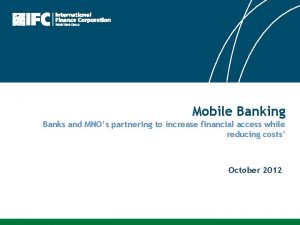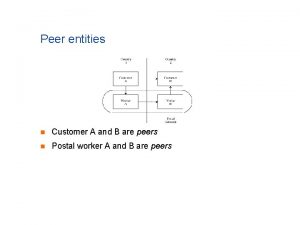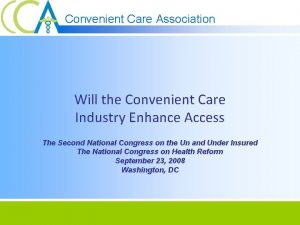Partnering with Traditional Healthcare Entities in the Convenient

















- Slides: 17

Partnering with Traditional Healthcare Entities in the Convenient Care Market Kimberly Hodgkinson Brian Jones Director, Finance & Operations Chairman & CEO Aurora Health Care Ventures Med. Basics Family Health Centers

Importance of Hospital Partnerships n Hospitals are a key driver in the healthcare continuum. n Significant number of convenient care clinic patients need services of a hospital. n Hospital support instills confidence in convenient care clinic patients.

Importance of Hospital Partnerships n Patients more likely to associate quality with healthcare system n Provision of integrated services n Enhanced provider support and involvement

Easing Physician Resistance n Clinics not designed to replace Primary Care Physicians. n Fosters “team-based” care for patients. n Patients without primary care physicians are referred to network physicians.

Easing Physician Resistance n Physicians are provided the opportunity to participate with the healthcare system n Patients see as an enhancement to physician services n Physicians are included in the care of their patients.

Continuity of Care n Focus: Non-invasive, routine procedures n For patients who need follow-up care after release from hospital, convenient care clinics offer convenient access to follow-up care.

Continuity of Care n Episodic care - not the management of chronic disease states n Communicate care with the physicians through a centralized process/EMR n Partnership allow access to an integrated healthcare system to enhance the care

Providing Supervising Physicians n Quality physicians maintain hospital loyalty when affiliated with convenient care clinics. n Medical Director and Supervising Physicians provided by partnering hospital system.

Providing Supervising Physicians n Integration with provider practices n Physician participation in services, protocol development and quality review n Physician alignment with integrated healthcare services

Referrals To and From ER/UC n Reduces the instances of hospital ER’s being used for non-emergency treatment. n Affords convenient care clinics a place to send urgent and emergency cases.

Referrals To and From ER/UC n Appropriate level of care at the right cost n Increase referral to primary care physician n Many times, convenient care is a lower cost for the patient

Co-Marketing / Brand Awareness n Development of joint community relations through health fairs and free screenings. n Signage in clinics and store exterior. n Joint advertising campaigns. n Website integration.

Co-Marketing / Brand Awareness n Convenient care clinics are an access point for primary care referrals through the use of DVDs, 800 line, and direct referral. n Potential pilot sites for screening services n Community outreach for healthcare system to retail consumers

Integration with Chronic Disease Programs n Convenient care clinics reinforcement of dietary modifications. n Development of joint education programs in convenient care setting. n Research studies.

Integration with Chronic Disease Programs n Co-development of education and services consistent with healthcare system care management priorities n Access to screening services for periodic self- monitoring n Convenient care clinics provide another touch point for access to information about chronic diseases and where to find services

Benefits to Hospital Systems n Increased referrals to Hospital Physicians n Reduction of non-emergent ER patients n Community awareness of hospital through partnering with convenient care clinics.

Benefits to Hospital Systems n Increased patient loyalty through simplified care n Care designed for the patient - right care, right place, right time n Coordinated care through referrals to the appropriate services
 Lorna maden
Lorna maden Partnering to build customer relationships
Partnering to build customer relationships What is partnering
What is partnering The partnering initiative
The partnering initiative Partnering session
Partnering session Mnos partnering
Mnos partnering Healthcare and the healthcare team chapter 2
Healthcare and the healthcare team chapter 2 Healthcare and the healthcare team chapter 2
Healthcare and the healthcare team chapter 2 Convenient form
Convenient form Comparative adjective of convenient
Comparative adjective of convenient Where was the setting of the story david swan
Where was the setting of the story david swan Floor rearing of silkworm
Floor rearing of silkworm A convenient stir rod for use with your spot plate
A convenient stir rod for use with your spot plate A convenient stir rod for use with your spot plate
A convenient stir rod for use with your spot plate Peer entities
Peer entities Weak entities
Weak entities Erm vs erd
Erm vs erd Entities in software engineering
Entities in software engineering
































